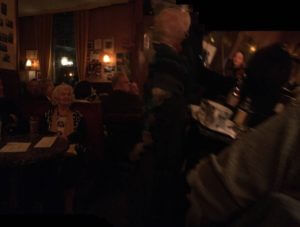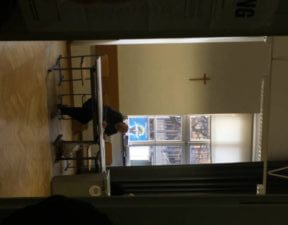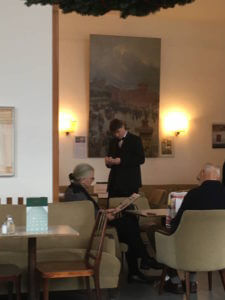Ricochet is the best place on the internet to discuss the issues of the day, either through commenting on posts or writing your own for our active and dynamic community in a fully moderated environment. In addition, the Ricochet Audio Network offers over 50 original podcasts with new episodes released every day.
 Postcards from Vienna
Postcards from Vienna
 Last Sunday, Norbert Hofer lost the Austrian presidential election to Alexander Van der Bellen. This was a re-run; the original vote was held in May, with Van der Bellen, an elderly former Green Party leader, defeating Hofer by little more than 30,000 votes. Hofer’s party — the Freedom Party — challenged the results of the May election on the grounds of procedural irregularities: The glue on the absentee ballots, they said, was defective. The Constitutional Court ruled in their favor and called for a repeat.
Last Sunday, Norbert Hofer lost the Austrian presidential election to Alexander Van der Bellen. This was a re-run; the original vote was held in May, with Van der Bellen, an elderly former Green Party leader, defeating Hofer by little more than 30,000 votes. Hofer’s party — the Freedom Party — challenged the results of the May election on the grounds of procedural irregularities: The glue on the absentee ballots, they said, was defective. The Constitutional Court ruled in their favor and called for a repeat.
Hofer is widely described as a far-right candidate, although I don’t think this term helps readers to understand what he represents. That said, I’m not sure that I can explain what he represents, even after a week of asking Austrian people what they thought he represented. I was surprised by the vagueness or the evasiveness of the response when I asked people, “So, what does Hofer stand for? What’s his ideology?”
Agnes Palmisano, a Viennese coloratura soprano who doesn’t care for Hofer, repurposed the Otto Reutter song for the election: Take the old one.
I asked her why the young one rubbed her the wrong way. She told me she wasn’t political by nature, and she usually avoided political arguments because she knew that “very frankly, I’m not informed.” But she instinctively found Hofer unwholesome. Her father was ethnically Slovenian, she said. She didn’t like the idea of predicating Austrian citizenship on German ethnicity. She was uneasy, too, about the way people wouldn’t say, forthrightly, that they planned vote for Hofer, even though they obviously meant to do it. The unwillingness to debate his ideas openly seemed unhealthy to her.
One of the most interesting people I met was Evgeni Dönmez, a Turkish-origin politician for the Green Party. He felt that people who voted for Hofer were responding to a very real problem — to the problem the culture many of the new arrivals brought with them, to Islamist authoritarianism — which his own party was unwilling to acknowledge. Hofer’s party, he said, was “asking the right questions.” But their answers were “absolutely the wrong ones.” This conversation was worthy of a post of its own; I’ll come back to this after I transcribe my notes from the meeting.

The polling station — a local high school.
…
In August of 2015, 71 refugees and migrants were found in the back of a truck on Austria’s A4 road. They had suffocated to death while being smuggled into central Europe.
A few days later, hundreds of refugees began walking from Budapest to Vienna. They were initially met with a wave of support. Austrian authorities begin ferrying refugees from the Hungarian border to Vienna, and then onto Germany via Salzburg. Some 170,000 refugees and migrants passed through Austria like this. The international media favorably contrasted Austria’s police and politicians with Hungarian authorities. Thousands of Austrians donated, volunteered to help the new arrivals, attended rallies in support of the refugees.
Not everyone in Austria was moved by this, however. Fear about immigration led to a surge in support for the Freedom Party, which immediately gained 15 percentage points in Upper Austria elections in September, then took 31 percent of the vote in Vienna elections in October.
On October 17, 2015, Hungary closed its border with Serbia and Croatia. By the end of 2015, thousands of migrants and refugees were trapped at Austria’s Slovenian border. Austria’s conservative Interior Minister, Johanna Mikl-Leitner, announced that Austria would build a fence to help control the flow. In the beginning of 2016, Austria built a barrier at the Brenner border with Italy. In March 2016, Macedonia, Croatia, and Slovenia shut their borders, with Austria’s encouragement. After the closure of that route and the strengthening of controls at Austria’s Italian border, refugees and migrants largely stopped trying to transit the country.
Austria accepted nearly 90,000 asylum applications in 2015 — one of the highest per capita numbers in Europe. But the government decided it couldn’t allow this to happen again, and announced a new annual upper limit on asylum applications of 37,500. The Austrian parliament adopted one of Europe’s toughest asylum laws. The bill permits the government to declare a state of emergency if migrant numbers suddenly rise and to reject most asylum-seekers directly at the border.
One year after the initial influx, Austria introduced one of Europe’s strictest asylum laws. Controls on the Italian border were strengthened. The Balkan route was cut off.
***
What most surprised me is that I expected to be able to see the effect this wave of migration had on the city. I’m not sure why I expected this, because rationally, 90,000 people wouldn’t be that visible in a city of 2.6 million. But the election I had come to see was represented, in the Anglophone media, as a contest between a left-wing candidate and an anti-immigrant populist. Why would an anti-immigrant populist gain purchase in Austria unless there was, visibly, a significant immigrant presence?
You might suspect that I had my globalist, rootless cosmopolitan blinders on, so I took as many photos and videos as I could. This is the city center, although most of the city looks like this, ethnically speaking:
I asked Lillibellt and her husband to take me to the neighborhoods people worried about. Here’s a so-called Turkish neighborhood:
Vienna is consistently ranked the world’s most prosperous and best-run city, and that prosperity is obvious. Well-made cars purr sleekly along wide roads free of traffic. On weekend mornings, the Viennese practice their equestrian skills and walk their greyhounds and Weimaraners in the woods. There are no bad neighborhoods; at least, none that I saw. Vienna is extremely wealthy compared to Paris. It’s extremely wealthy compared to Seattle, for that matter. It’s still the cradle of Alpine skiing, topped-rank in Mercer’s personal safety index based upon internal stability, crime, effectiveness of law enforcement.
Even Vienna’s public housing projects, in the center of the city, are luxurious and immaculately maintained. It’s true that they’re spooky to walk through at night, but only because the streets were so absolutely silent and empty.

High gothic architecture is glorious, if spooky. St. Stephen’s Cathedral.
And everything in Vienna looks a bit spooky to me, because it’s the dead of winter, and there’s something about Central Europe — Gothic architecture, in particular — that suggests ghosts, hauntedness, a permanent Halloween.
It would be epic arrogance to claim that after six days in Vienna, I fully understand the situation — particularly because I don’t speak German. My impression, though, was that Vienna looked barely affected by the refugee crisis.
Perhaps what caused people to feel overwhelmed was the fall of 2015, when, everyone agrees, the authorities lost control. When Merkel she said there would be “no limit” to the number of refugees Germany would accept, it caused people to think that literally millions of people would soon show up in Austria. I took her statement to mean (as I still think she probably intended), that Germany would set a good example and accept a generous number of refugees, this in the expectation that other countries would do the same. But it was understood as a genuinely insane statement, one that literally meant, “We will accept as many needy people as there are in the world, perhaps billions.” The failure to discuss the situation forthrightly gave the impression that the authorities generally, and Merkel particularly, had taken leave of their minds.
I wonder if the sense of crisis could have been forestalled had the Austrian Chancellor said from the first, “We’ve studied our budget and come up with a c oncrete number of refugees we can accept, feed, house, and educate until their country is safe or until they enter the workforce. That number is four-tenths of a percent of our population per annum. We will pay for this by making these specific cuts to our budget, and raising taxes by this amount. People who wish privately to sponsor more refugees are welcome to do so, so long as the refugees in question pass security and background checks, for which you as the sponsor must pay. Asylum applications must be processed at the border to ensure that no one enters the country on an illegitimate claim. Here is the plan. It is a specific plan.” It was the vagueness of the official response, I suspect, that made people lose their minds.
oncrete number of refugees we can accept, feed, house, and educate until their country is safe or until they enter the workforce. That number is four-tenths of a percent of our population per annum. We will pay for this by making these specific cuts to our budget, and raising taxes by this amount. People who wish privately to sponsor more refugees are welcome to do so, so long as the refugees in question pass security and background checks, for which you as the sponsor must pay. Asylum applications must be processed at the border to ensure that no one enters the country on an illegitimate claim. Here is the plan. It is a specific plan.” It was the vagueness of the official response, I suspect, that made people lose their minds.
 There are no hordes; Austria has not been overrun.
There are no hordes; Austria has not been overrun.
It’s true that if the borders had stayed open, and if everyone who wanted to come to the West had shown up in Austria, Austria would, indeed, have been inundated and unable to cope. That week, or ten days, extrapolated over a year, say, would be the nightmare people believe they can already see. But it didn’t happen, and it won’t.
It looked manageable to me. But if people think there’s no way to discuss immigration forthrightly, perhaps it doesn’t look manageable.
On the other hand, if a politician is telling you there’s a huge problem, but you can’t see it — why would you trust him, either? I was surprised that Norbert Hofer was defeated by such a big margin, but perhaps I shouldn’t have been.
Published in General



Should people wait until it’s too late to respond to a crisis? Do you have to wait for the declaration of war before you can start re-arming? You almost imply that Austria/Vienna would have to lose its enviable lifestyle before it would be legitimate to respond to a threat. Surely, in a democracy, people are entitled to respond to a trend they see developing with a sharp corrective before things have gone horribly wrong. Which seems to have happened.
Where do you think the unwillingness to debate Hofer’s ideas comes from? Because his supporters are really a basket of deplorables animated by the darkness that lurks in the Austrian soul? Or because Austrians have been told by the great and the good that a concern with their own culture and wellbeing is icky? Or…?
Both, I would guess. People are certainly entitled to anticipate and respond to crises, but if your news source tells you that Austria’s been overrun by migrants, I’d look for a new source of news.
This sounds like the beginning of something really interesting, Miss Berlinski. I don’t really have kind thoughts about Germany &, by extension, about Austria, so far as the societies are concerned. The sense I get is, they’re losers. They don’t have politics in any real sense & they spook easily–for super-orderly, super-wealthy societies, they have no idea how to deal with even minor concerns. They therefore begin to insist on who they are, as though they really knew or were about to find out. They’re not & they won’t. As soon as Germany loses its grip on Europe, its fake sense of responsibility for the EU, this might get better, but not much better.
I would have liked to hear about your conversations with locals, however. For my money, that’s where the action is, in the things people remember & notice, the things that stick with them & what they sense about the importance of all these necessarily fragmentary things–that points the way to the whole, to how they think about their society.
Well, I’ve got lots of notes, and lots of audio files, so either here or in the book you’ll hear more about the locals — I spoke to people who were for Hofer, people for Van den Bellen, Turkish immigrants, Jews, refugees, a pretty wide socioeconomic spectrum.
I wouldn’t use the word “losers.” Providing the level of material affluence I saw there is a tremendous achievement. There’s a reason refugees are fleeing to Austria, after all. And certainly they have politics: I just watched a free and fair election. But “spooking easily” sounds apt to me.
Miss Berlinski, I don’t call them losers because I don’t like them. It’s because they spook. Winners don’t act that way. Societies that lack any kind of confidence & think of order as defensive measures in a crisis–they do not seem to know that they’re wealthy, stable, & the envy of the world, do they? Why is that? Politics basically is about how a community organizes its sense of justice & its sense of its own pride. How can there be such a massive discrepancy between what social science might call wellbeing or whatever & the actual, visible panicky responses to minor dangers & inconveniences?
Don’t fall into the trap the chattering classes in the US seem to have done, assuming that if someone has come to a different conclusion than you approve of they must have been mislead by Fake News. (Or sophisticated propaganda initiatives. (Or deplorableness, of course.))
People notice stuff. Suddenly there is halal meat in their supermarket. At their neighbour’s niece’s school headscarves are becoming more common. The first reaction of the local political elites to another terrorist atrocity in Europe is to warn against islamophobia. All this happens without these changes being an explicit part of anyone’s political program, but somehow no-one talks about it. Except the crazy fringe guys. So maybe you start listening to them…
It is only anecdotal, but, reading a blog by an expat living in rural Austria, it seems that the authorities have disbursed the new arrivals throughout the country where local authorities house them in hostels and where they do not have a great deal to do.
Was there any suggestion of an atavistic “gates of Vienna” feeling?
I absolutely agree with this, and as Lillibellt will confirm, by the end of the trip I was teasing her and her husband: This is your idea of a crisis? This is your idea of a bad neighborhood? And they were laughing, because it was true that every neighborhood we drove through was more beautiful and well-manicured than the next. She could see it, I think, through my eyes, suddenly: a city with no bad neighborhoods, no slums — that looks quite impressive to an American visitor. There’s an urban-housing project that’s literally called Karl Marx-Hof. I’m thinking, “at least that’s got to look like Stalag 17, right?” No, it’s gorgeous.
I don’t know. I’ve been asking that too, but the only answers I can think of sound like cheap pop psychology.
I like the Stalag 17 reference. Folks, if you’ve not seen it, there’s a great Billy Wilder movie about it.
As for the question we’re facing, let’s talk about it some time-
I visited a refugee reception center. The refugees I spoke to didn’t yet have asylum (or the right to work), but they were busy studying German (taught by a volunteer who wasn’t sure they would all qualify for their German tests) and cleaning, taking out trash, caring for their kids. They had been there for as much as a year, and they were eager to get out of there, I think. But they were also incredibly grateful to be there. They had crossed overland from Afghanistan, and they knew how lucky they were to be there.
Here are a few photos. It used to be a geriatric center, now there are about 200 refugees living there, waiting for their “second interview.” The coordinator of the center said he was pretty sure they would all ultimately be given asylum.
Was there any suggestion of an atavistic “gates of Vienna” feeling?
Yes, the effort to put boundaries on speech has backfired badly. People suspect they’re being lied to, that the problem is worse than what they see and what the media reports — and there’s a rational basis for suspecting this, because whole areas of discourse have been ruled out of bounds.
Maybe there are too many people watching fox news in the bars?
I wouldn’t go so far as to talk about a rational basis. The question here is about the dignity of the democrats that make up the democracies. It’s about what is meant by consent of the governed. The wide European consensus, that the classes who govern will govern & the democrats in the democracies will get benefits thereby, so they shouldn’t bother with politics–this was never going to last. It never has before.
Mr. Brett Stephens in the WSJ seems to be learning some of this, though who knows how much or how seriously. The big deal issues he does not see. He has no idea about the future of democracy, or that there is one. Well, there will be one.
Great reporting, Ms Berlinski. Learned things about Vienna I never knew. On camping trips, those little cans of Vienna sausage always hit the spot. Michael Henryski
But I haven’t even started! This really is just a postcard. I hope there’s appetite for more.
Completely out left field: Are you at all an admirer of Stefan Zweig’s writing about Vienna?
The description “the Pepsi of Austrian writing” ruined him for me.
I think this is the key to what’s happening. I’m not a fan of John Derbyshire, but he occasionally gets one right: When an important question is placed outside the bounds of “respectable” debate, the opportunity is opened for not-so-respectable candidates to seem like saviors.
If you’re lucky you get Nigel Farage. If you’re unlucky you get Norbert Hofer. Donald Trump, Marine Le Pen, and Beppe Grillo seem to fall somewhere in the middle, and time will tell which end they trend toward.
Mr. Dönmez, having identified “absolutely the wrong” answer has ready to mind absolutely the right ones.
Oh yeah.
I hope Herr Hoffman never came up with anything yet more cretinous, but I dare not believe it. You might want to know something about the past of Vienna & I’m not sure who can help you out quite as well as Zweig-
I love you camera clips. As to the substance, this is anecdotal, if not less than anecdotal. Even in the USA, 12 million illegals wouldn’t be noticeable on a camera or to the populace. Mass waves of immigration strike at the heart of what one considers their culture. No one who is happy with their culture wants their culture to change. Even in NYC we now have Islamic holidays for the schools. Of course that’s fair given their population increase, but I’d rather we didn’t. That’s just a subtle and insignificant example. However, it’s rather irksome that I would have to accomodate something foreign and contrary to my Judeo-Christian and American sensibilities. Project ahead and when will they be sounding that Muslim call to prayer in the streets? There was a time in our earlier history where immigrants tended to Americanize their names. Do you see that anymore? I don’t mind a handful of immigrants but what’s a handful? Count me as one who doesn’t want any more.
I was surprised by the vagueness or the evasiveness of the response when I asked people, “So, what does Hofer stand for? What’s his ideology?”
How quaint, expecting people to know what someone stands for or what ideology even means.
Actually it reminds me of Sean Hannity and his occasional man-in-the-streets interviews…LOL. He catches people who don’t even know who the vice president is.
How can we develop a permissible language about national identity and cultural preferences?
I live in an area with an enormous influx of foreign-born persons, many of then southwest and east asian and middle eastern immigrants attracted to the high tech centers in our county. They are invariably good neighbors who achieve participation in American life without the complete loss of cultural heritage. They all arrive by complying with onerous immigration/visa rules (as did my UK-born sister-in-law). They’re a major net plus for the USA.
There is also in our county a fast-growing central American population, largely if not mostly illegals who detract from neighborhoods, add to crime rates, don’t learn English, don’t drive legally with insurance and yet get bend-over-backwards treatment from the elites who run things.
The previous sentence is largely barred from polite official discourse.
It is like having a group of people who crashed the party, invite their friends to join them and refuse to leave but the hostess won’t act unless and until her good china starts getting smashed but by then the party is ruined anyway.
I guess for Germans and Austrians, the assertion of cultural preferences (even within one’s own borders) has unfortunate historical echoes but the larger PC sensibility habits in both Europe and the USA are the real problem. We leave it to the extremists to speak the truth because nobody else is allowed to do so.
My parents lived in Vienna (suburbs) for several years and I was able to visit them in the 1990’s for weeks at a time. The Austrians have a very (Germanic) view of what is correct (Das ist richtig). I always preferred visiting the comparative chaos of Budapest and Bratislava to the (sometimes) cold efficiency of Vienna. My parents would talk about the haughtiness of the older Viennese toward families with multiple children (particularly loud children). They would gladly dote on lapdogs, but not kids. This may be some of the right’s response to the refugees that they see on the news.
It was a beautiful city to visit, but I wouldn’t want to live there.
Does any politician running for office in modern technocratic state really “stand for” something? Let alone having an ideology. What would that actually look like, anyway? What does Fillon, Le Pen, Merkel or May “stand for”?
You might find it interesting that the term “Judeo-Christian” really only came into use in the United States in the 1940s. I’m citing Wikipedia on this, but it’s not my only source:
In other words, the term and even the idea emerged as part of a liberal anti-discrimination project.
You know, I don’t know, and it’s a good question. We need a language to talk about this that’s useful, in that allows us to speak meaningfully about cultural traits we like and value and ones that we don’t, while also being kind, being aware that individuals are not defined by their culture, and not being patronizing. And obviously the language we’ve been using until now hasn’t been working.
What would the elements of that language be?
In some ways the people who try to push political correctness down students’ throats seem to me to be compensating for parenting deficits. What’s now called “microaggression” used to be called “rudeness,” or “bad taste.”
And often what now passes for plain-speaking, or “telling it like it is,” is just rudeness or intellectual laziness.
Surely we should be able to find a way to talk about things like real differences in cultures, and why some cultural traits that immigrants bring to our countries are not loveable to us, in a useful way. One that encourages immigrants to behave more as we do, both for our benefit, for theirs, and for the sake of social harmony.
I didn’t sense the obstacle to this was the immigrants, at that refugee shelter, for example. They wanted to be European. They weren’t sure how to do it yet, but they were really trying.
I find it interesting, but I don’t see how it’s relevant. If the term didn’t exist, the understanding certainly did. You can go back to at least St. Augustine (4th century), if not earlier, to find how the culture was married to Old and New Testament (i.e., Jerusalem) outlook with the Greco-Roman (i.e., Athens and Rome) outlook.
OK, so? Life is ironic, isn’t?